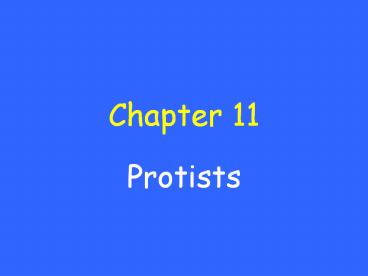Protists PowerPoint PPT Presentation
1 / 21
Title: Protists
1
Chapter 11
- Protists
2
Protist Charateristics
- Protists unicellular or multicellular
eukaryotes that may be autotrophic or
heterotrophic - Autotrophs are organism that makes its own food
3
- Heterotroph an organism that gets its food by
eating other organisms - Ways protists get food
- Photosynthesis (autotrophs)
- Eating other organisms (heterotrophs)
- 3. Decomposers getting food by breaking down
dead organic matter
4
4. Parasite invading another organism to get
food An organism that a parasite invades is
called a host Parasites cause harm to their hosts
5
Reproduction in protists Protists reproduce by
sexually (conjugation) and asexually (binary
fission) and complex reproductive cycles (by
changing forms)
6
Examples of conjugation in Spirogyra
7
Examples of binary fission
8
- Kinds of protists
- There are three groups of protists
- Protist producers
- Heterotrophs that can move
- Heterotrophs that cant move
9
1. Protists producers Red algae multicellular
marine seaweed, most of the worlds seaweed is red
algae (ex. seaweed)
10
Protists producers Green algae most diverse,
most live in freshwater (ex. volvox, spirogyra)
11
Brown algae live in salt water near rock coasts
in cool areas (ex. kelp)
12
Diatoms (phytoplankton) unicellular,
photosynethetic organisms with shells made of
silica
13
Dinoflagellates unicellular, have two flagella
(whiplike structure helps in movement)
14
Euglenoids unicellular, live in freshwater, are
both producers and consumers
15
- 2. Heterotrophs that can move
- Amoebas
- Flagellates
- Ciliates
16
Amoebas no cell wall, form pseudopodia (false
feet) for movement and for engulfing
food Flagellates have one or more flagelle for
movement, some cause diseases Ciliates have two
nucleuses, hundreds of hairlike structures called
cilia. Cilia are used for movement and feeding
17
18
3. Heterotrophs that cannot move
- spore-forming protists
- water molds
- slime molds
19
CANNOT MOVE
- spore-forming protists all are parasites and
use 2 or more hosts (ex. these protist cause
malaria and use both mosquitoes and humans as
hosts)
20
CANNOT MOVE
- water molds live in moist areas, most are
parasitic their hosts are plants, animals,
algae, or fungi
This type of mold is called eck
21
CANNOT MOVE
- slime molds live in moist areas of the woods
and fresh water. Some live colonies others are
single-celled.

